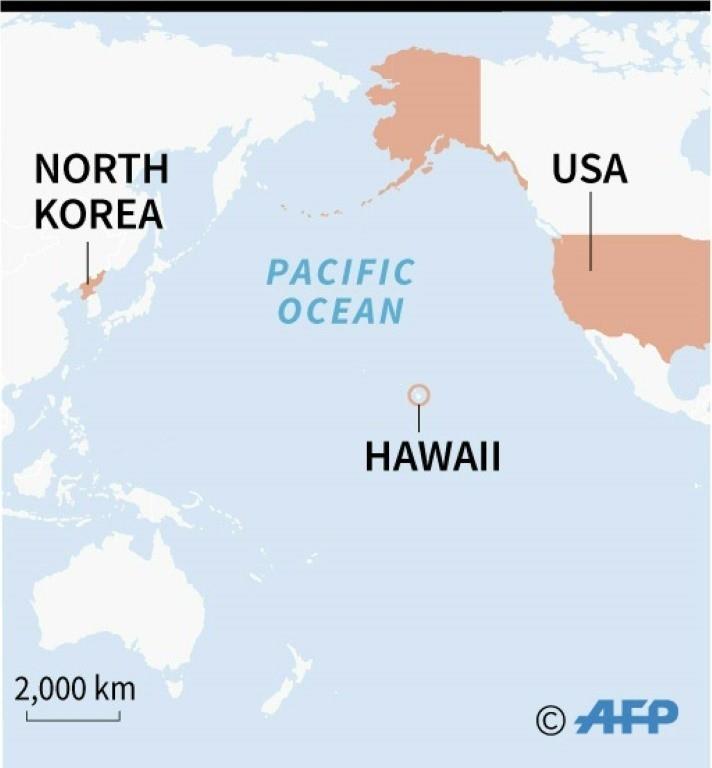AFP, Jan. 14, 2018 – A top US official on Sunday defended government early-warning systems after a false missile alert terrified Hawaii, in what a congresswoman called an epic failure that emphasized the need for talks with North Korea.
The Pacific archipelago was already on edge over fears of a North Korean attack when the phones of residents and tourists blared the alert just after 8:00 am (1800 GMT) on Saturday.
Emergency management officials later admitted “the wrong button was pushed” during a shift change.
But it took them nearly 40 minutes to issue a corrected message. Hawaii’s governor said there was no automatic way to cancel the false alarm, meaning it had to be done manually.
Hawaii Congresswoman Tulsi Gabbard issued her own advisory of the false alarm much earlier after directly checking with civil defense officials, she told ABC News/”This Week.”
“It’s an epic failure of leadership,” said Gabbard.
“It was unacceptable that this went out in the first place, but the fact that it took so long for them to put out that second message, to calm people, to allay their fears that this was a mistake, a false alarm is something that has to be fixed, corrected with people held accountable,” she told the program.
The alert, which read “BALLISTIC MISSILE THREAT INBOUND TO HAWAII. SEEK IMMEDIATE SHELTER. THIS IS NOT A DRILL”, sent people rushing for safety whether in a bathtub, a basement, a manhole or cowering under mattresses.
The Federal Communications Commission, which is responsible for Emergency Alert System procedures, promised a “full investigation.”
The erroneous message came after months of soaring tensions between Washington and Pyongyang, which claimed it had successfully tested ballistic missiles that could deliver atomic warheads to the United States, including the Hawaiian islands popular with tourists.
Homeland Security Secretary Kirstjen Nielsen urged people “not to draw the wrong conclusion” from the Hawaii incident.
“I would hate for anybody not to abide by alert warnings coming from government systems,” she said on Fox News Sunday.
“They can trust government systems, we test them every day. This was a very unfortunate mistake, but these alerts are vital, seconds and minutes can save lives.”
– Risk of accidental war –

Hawaii ‘missile alert’
She said her department is working with state and local authorities “to make sure it doesn’t happen again.”
Vern Miyagi, administrator of Hawaii’s Emergency Management Agency, confessed at a press conference that “we made a mistake,” for which he apologized.
“We’ve spent the last few months trying to get ahead of this whole threat, so that we could provide as much notification and preparation to the public,” he said, pledging to investigate what happened and to avoid a repetition.
He said a rule has already been put in place ordering that two people be present before the button is pushed to issue an alert. A cancellation message “template” will also be created to avoid a delay like that on Saturday, the report said.
“What happened today was totally unacceptable,” Hawaii Governor David Ige said.
The false alarm highlighted a broader issue — the risk of accidental nuclear war, said Gabbard, a Democrat and Iraq war veteran.
“We have got to get to the underlying issue here of, why are the people of Hawaii and this country facing a nuclear threat coming from North Korea today? And what is this president doing urgently to eliminate that threat?” she said on CNN’s “State of the Union.”
“I have been calling on President Trump to directly negotiate with North Korea,” Gabbard said.
President Donald Trump recently said that, under the right circumstances, he would be willing to speak directly with North Korean leader Kim Jong-Un, with whom he has traded sharp words over Pyongyang’s missile and nuclear tests.
The White House said Trump was briefed about the Hawaii incident, but called the alert “purely a state exercise.”








